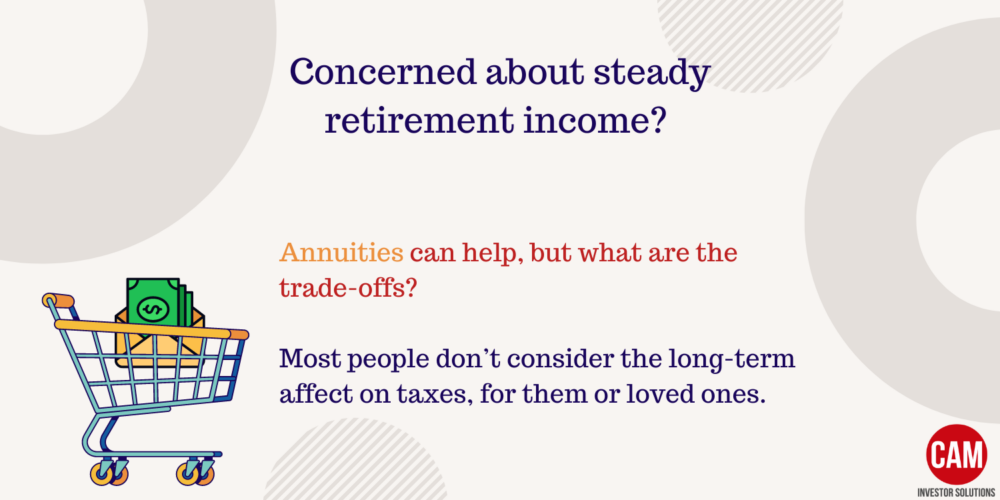Tax advantaged investment strategies are becoming a priority for high-net-worth investors…

Annuities in Retirement: Navigating Potential Tax Pitfalls
With the unpredictable nature of interest rates and the markets, some people are looking for something that’s more of a guarantee. They want to know their money will be safe, while also growing their money. This is where annuities comes into their picture during their research. But annuities are not a one-stop solution. The types and fine print of each annuity are uniquely different – just like every individual stock in the market is uniquely different.
When planning for a financially secure retirement, annuities often come up as a viable option for ensuring a steady income stream. However, as with any financial product, annuities come with their own set of complexities, especially when it comes to tax implications. Let’s explore how annuities might fit into your financial plan and what you should consider to avoid potential tax pitfalls.
Is This the Right Time for Annuities?
During times of uncertainty, some people just want to feel safe. As we age and lose our ability to earn more income, that sense of financial safety may grow more urgent. Our anxieties about the future and “will we have enough” can kick in and fear may drive our decision making.
Annuities are complex and should be considered very thoroughly. They can be a double-edged sword. On one hand, they offer the assurance of a predictable income in retirement, which is a significant draw for many retirees. The right annuity can act as a buffer against the risk of outliving your savings, providing financial security that your pension or Social Security might not fully cover.
On the other hand, they may not offer enough growth to keep up with inflation. The lower cost annuities are going to have lower guaranteed payments, growth rates or interest rate caps. As they say, there’s no such things as a free lunch. To ease your fears and concerns, there is a cost. Your growth potential is limited and you’re paying a fee to limit it.
If anyone is suggesting you need MORE annuities other than what you already own, or they’re suggesting you need more than one to start – be wary. More annuities does not mean better. More annuities can complicate your future income flows and tax management quite a bit.
Understanding Annuity Types and Their Tax Implications
Annuities come in various forms—variable, fixed, and indexed. Each has different features, risks, and tax considerations.
- Variable Annuities offer a payout that varies based on the performance of the investment options you choose. While they can potentially increase in value, they also carry higher risk and complex fee structures.
- Fixed Annuities provide a guaranteed payout, which is less risky but might not keep pace with inflation.
- Indexed Annuities are tied to a specific market index but often cap the maximum return you can receive.
Within each of these annuity types, each firm offering annuities adds their own special twists and riders. Just like every every car manufacture adds bells and whistles to their products to offer a variety at different price points for their consumers, so do annuity firms. For the right price (i.e. more fees) you can get more guarantees and extras.
One should consider many things when choosing if an annuity is right for them, and if so, which type. Things like expected future health and life expectancy are important. Knowing what your future income needs will be is very important. Do you want the money to end when you die or do you want it to be passed on to your spouse or heirs?
A big consideration many may not consider are: taxes! The growth of an annuity is tax-deferred, just like a 401(k) or an IRA. This means you don’t pay taxes on the income and investment gains from your annuity until you withdraw the money. However, this can also be a pitfall if the withdrawals coincide with other sources of taxable income, potentially pushing you into a higher tax bracket unexpectedly. At some point you may be required to receive: social security, 401(k)/IRA monies and your annuity income. How will that affect your taxes?
Long-Term Considerations: Health, Estate, and Generational Wealth
Before purchasing an annuity, consider how it fits with your long-term health, estate planning, and generational wealth transfer goals.
Long-term health coverage can be expensive. An annuity can help cover these costs if the payments are enough or if the annuity has a long-term care rider. However, having money locked up in an annuity can be detrimental if the payments are not enough. If you need access to larger amounts of cash, sooner – the annuity terms may not allow you to withdrawal what you need.
Estate planning and wealth transfer – knowing when your annuity terminates is crucial when considering how you will support a surviving spouse or your heirs. Will the annuity continue to pay out? Who will receive it and what are the rules around when they are required to take out money from the annuity? Forcing annuity distributions on a surviving spouse or heirs may put a tax burden on them. On a positive note, it may provide them with income they still need. Your family is unique and thorough consideration should be given to estate planning when purchasing an annuity.
Reviewing Your Current Annuity
If you already own an annuity (or multiple), regular reviews are essential to ensure it still fits your financial situation. Changes in market conditions, financial needs, or personal circumstances like health can alter the suitability of your annuity. Review the fees, riders, and benefits, as well as the tax implications of sticking with your current annuity versus making a change.
If you’ve owned your annuity for many years, chances are the market conditions are different now. Does your annuity still look attractive compared to what you can get in the open market? Are there other investment vehicles that may be better now, that weren’t available when you bought your annuity? Their may be a surrender charge (fee) to get out of your annuity, but it may be worth it in the long run. We can help you run the numbers.
Trade-offs Between Assurance and Control
Deciding whether to invest in an annuity often involves a trade-off between wanting the assurance of steady income and maintaining control over your financial assets. It’s vital to balance these factors with the potential tax implications and how they align with your overall retirement planning.
Navigating the complex landscape of annuities requires a deep dive into your personal financial situation, ideally with the help of a fee-only financial advisor. A fee-only financial advisor who is a fiduciary will review what’s best for you, with no conflicts related to annuity commissions.
Understanding the nuances of each type of annuity and how it fits into your broader financial and life goals can safeguard against unforeseen high expenses, limited investment growth and tax issues. Having the right investments and products in your portfolio can ensure that you achieve a financially stable retirement.
Remember, every financial decision should be made based on your specific circumstances and in consultation with a fee-only financial advisor who understands the intricacies of tax laws and retirement planning. This thoughtful approach will help you avoid the “retirement tax avalanche” and secure your financial future in your golden years.
CAM Disclosure
M & A Consulting Group, LLC, doing business as CAM Investor Solutions is an SEC registered investment adviser. As a fee-only firm, we do not receive commissions nor sell any insurance products. We provide financial planning and investment information that we believe to be useful and accurate. However, there cannot be any guarantees.
This blog has been provided solely for informational purposes and does not represent investment advice. Nor does it provide an opinion regarding fairness of any transaction. It does not constitute an offer, solicitation or a recommendation to buy or sell any particular security or instrument or to adopt any investment strategy.
Past performance is not a guarantee of future results. Diversification does not eliminate the risk of market loss. Tax planning and investment illustrations are provided for educational purposes and should not be considered tax advice or recommendations. Investors should seek additional advice from their financial advisor or tax professional.



